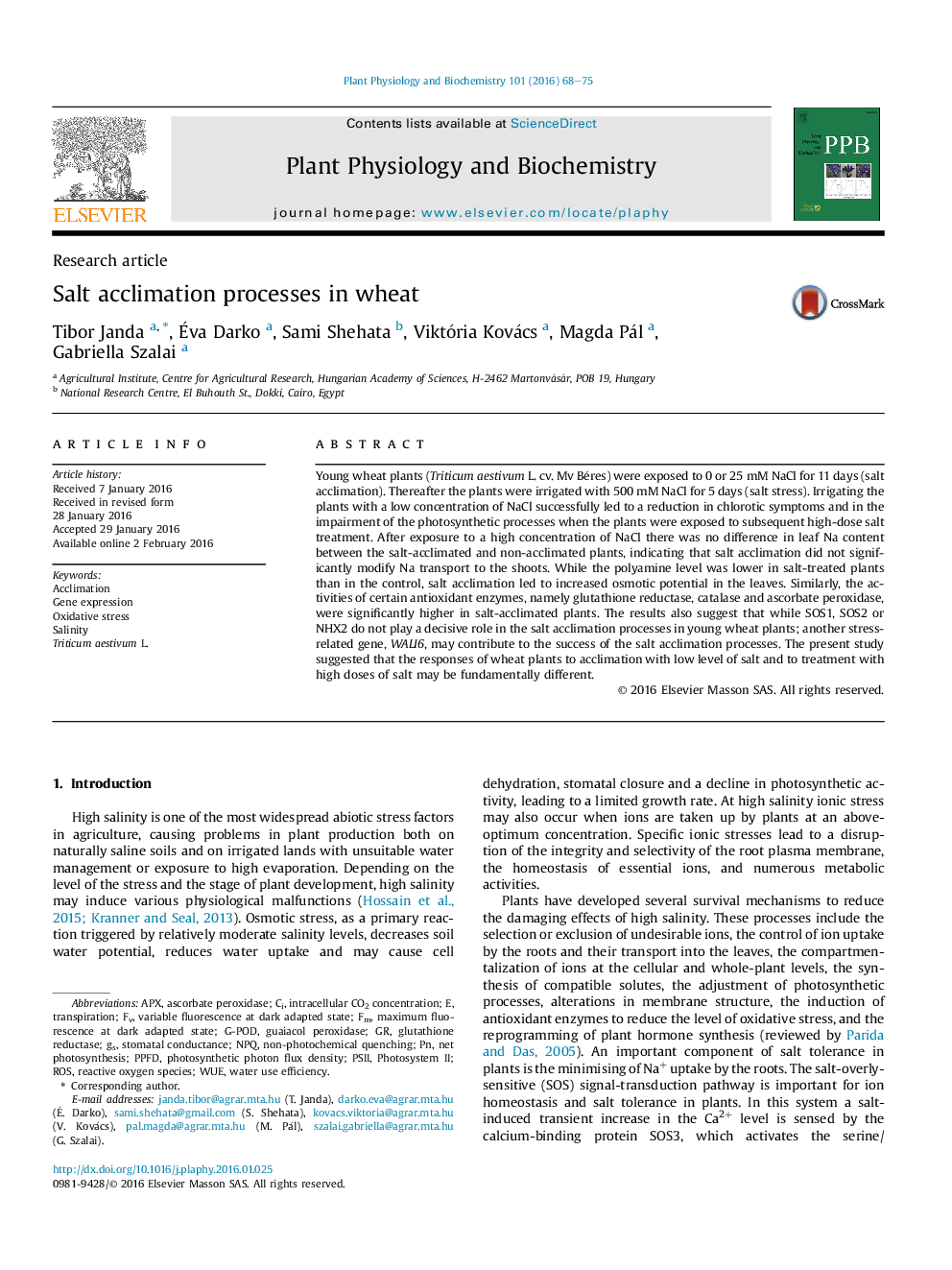| کد مقاله | کد نشریه | سال انتشار | مقاله انگلیسی | نسخه تمام متن |
|---|---|---|---|---|
| 8354115 | 1541920 | 2016 | 8 صفحه PDF | دانلود رایگان |
عنوان انگلیسی مقاله ISI
Salt acclimation processes in wheat
ترجمه فارسی عنوان
فرایندهای آکریلاسیون نمک در گندم
دانلود مقاله + سفارش ترجمه
دانلود مقاله ISI انگلیسی
رایگان برای ایرانیان
کلمات کلیدی
APXintracellular CO2 concentrationG-PODNPQTriticum aestivum L.PPFDPSIIWUEROS - ROSWater use efficiency - بهره وری استفاده از آبGene expression - بیان ژنTranspiration - تعرقOxidative stress - تنش اکسیداتیوNon-photochemical quenching - خنک سازی غیر فتوشیمیاییAcclimation - سازگاریSalinity - شوریphotosynthetic photon flux density - فتوسنتز تراکم شار فوتونnet photosynthesis - فتوسنتز خالصPhotosystem II - فتوسیستم 2Stomatal conductance - هدایت گرمایشیascorbate peroxidase - پراکسیداز آسکورباتیglutathione reductase - گلوتاتیون ردوکتازguaiacol peroxidase - گوایاکول پراکسیدازReactive oxygen species - گونههای فعال اکسیژن
موضوعات مرتبط
علوم زیستی و بیوفناوری
علوم کشاورزی و بیولوژیک
دانش گیاه شناسی
چکیده انگلیسی
Young wheat plants (Triticum aestivum L. cv. Mv Béres) were exposed to 0 or 25Â mM NaCl for 11 days (salt acclimation). Thereafter the plants were irrigated with 500Â mM NaCl for 5 days (salt stress). Irrigating the plants with a low concentration of NaCl successfully led to a reduction in chlorotic symptoms and in the impairment of the photosynthetic processes when the plants were exposed to subsequent high-dose salt treatment. After exposure to a high concentration of NaCl there was no difference in leaf Na content between the salt-acclimated and non-acclimated plants, indicating that salt acclimation did not significantly modify Na transport to the shoots. While the polyamine level was lower in salt-treated plants than in the control, salt acclimation led to increased osmotic potential in the leaves. Similarly, the activities of certain antioxidant enzymes, namely glutathione reductase, catalase and ascorbate peroxidase, were significantly higher in salt-acclimated plants. The results also suggest that while SOS1, SOS2 or NHX2 do not play a decisive role in the salt acclimation processes in young wheat plants; another stress-related gene, WALI6, may contribute to the success of the salt acclimation processes. The present study suggested that the responses of wheat plants to acclimation with low level of salt and to treatment with high doses of salt may be fundamentally different.
ناشر
Database: Elsevier - ScienceDirect (ساینس دایرکت)
Journal: Plant Physiology and Biochemistry - Volume 101, April 2016, Pages 68-75
Journal: Plant Physiology and Biochemistry - Volume 101, April 2016, Pages 68-75
نویسندگان
Tibor Janda, Ãva Darko, Sami Shehata, Viktória Kovács, Magda Pál, Gabriella Szalai,
